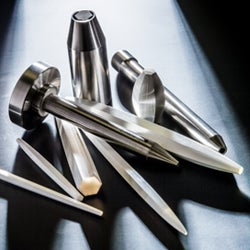- Analyzers
- Optics & Sources
- Technologies
- Support
- About
Revolutionizing Research: How Optics Enhance Experiments in Your Physics Lab
Brendan Waffle
Revolutionizing Research: How Optics Enhance Experiments in Your Physics Lab
Brendan Waffle
Brendan Waffle
In the realm of physics research, scientists strive to uncover the fundamental principles governing the natural world. This often involves conducting experiments that require highly precise measurements, detailed structural analysis, and the ability to observe phenomena on both macroscopic and microscopic scales. Optics play a crucial role in achieving these goals. They enhance the resolution, sensitivity, and efficiency of various analytical techniques and enable physicists to push the boundaries of their research.

Polycapillary X-ray optics are essential for various analysis techniques, including micro X-ray fluorescence (micro-XRF). They have propelled the capabilities of XRF analysis by pairing a polycapillary optic to a divergent X-ray source, redirecting the X-ray beam to a small, dense, output focal spot—on the scale of tens of microns in diameter.
A polycapillary optic captures a large solid angle of X-rays from an X-ray source and redirects them to a micron-sized focal spot or a highly collimated beam. The X-ray intensity achieved with such optics is a few orders of magnitude higher than that obtained with conventional pinhole collimators, contributing to the significantly improved X-ray analysis performance in detection sensitivity, spatial resolution, measurement speed, and precision. XOS optics are widely used in commercial instruments and customized X-ray analysis systems for various industrial and research applications in the fields such as microelectronics, semiconductor manufacturing, pharma, and life sciences.

Polycapillary optics also enhance X-ray diffraction (XRD) analysis by improving measurement speed and precision. Typically, XRD analysis is performed using two configurations:
Efficiency in Parallel Beam XRD: Polycapillary optics improve the overall efficiency, allowing lower powered X-ray sources to be used, thus reducing costs and maintenance.
Precision in Convergent XRD: Polycapillary focusing optics enable micro XRD analysis with micro-focus focal spots, exciting very small sample areas.
Flexible Configuration: Optimize the convergent angle and X-ray intensity with interchangeable apertures at the output end of the optic.
Parallel Beam XRD: Phase distribution measurements in pharmaceuticals and steel, thin film texture measurements for superconductors and magnetic films, structure measurements for proteins, stress analysis, Laue X-ray camera, and powder diffraction for material research.
Convergent Beam XRD: Micro XRD applications in detailed stress analysis and high-precision texture measurements.
Related: Maximizing Polycapillary Optic Performance: Choosing the Perfect X-ray Source and More
By leveraging our advanced polycapillary X-ray optics, physicists can achieve high precision, sensitivity, and efficiency in their experiments. These optics empower researchers to conduct more detailed and accurate analyses, ultimately driving forward our understanding of complex physical phenomena and enabling breakthroughs in various scientific fields.
Ready to revolutionize your research? Reach out to our team of experts and learn more about how X-ray optics can support your lab.

With over 5 years of experience designing X-ray optics and repairing X-ray equipment, Brendan Waffle brings a proven track record of surpassing customer expectations and pioneering innovative solutions. Acknowledged as a strategic partner by XOS customers, Brendan goes beyond being just a consultant, demonstrating a unique ability to tailor customized solutions for national labs, universities, and X-ray equipment manufacturers.
Helping customers devise innovative solutions is my passion,” Brendan affirms, emphasizing his dedication to driving advancements in the field of X-ray optic design.
If you'd like to get in touch with Brendan or one of our other experts, click here.

